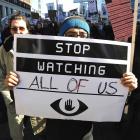Gerontocracy endangers democracy.
Internet surveillance
Follow:
-
New U.K. Surveillance Bill Slammed By Privacy and Civil Rights Groups
The Investigatory Powers Bill – or “Snoopers Charter” – is now enshrined in U.K. law, forcing internet and mobile phone companies to keep a record of all citizens’ browsing and phone use, even if they aren't suspected of terrorism.
-
Privacy Advocates In Uproar Over UK Cyber Surveillance Bill
Following terror attacks on Paris last month, the spectre of a Draft Investigatory Powers Bill now looms over Britain as lawmakers debate instituting the most invasive cyber-surveillance regime to date.
-
Exclusive: Protests Reignite In Turkey As Erdoğan Pushes Bill To Censor Internet
Pressure is piling on Turkey not to enact a far-sweeping law that would allow authorities to censor the Internet and require ISPs to keep tabs on every subscriber's browsing habits for two years.
-
How the Government Can Still Get Your Digital Data
The U.S. government isn't allowed to wiretap American citizens without a warrant from a judge. But there are plenty of legal ways for law enforcement, from the local sheriff to the FBI, to snoop on the digital trails you create every day.
-
Internet Privacy? Not if Government Has Its Way
On Thursday, the Senate will consider a new bill that allows the government to have total access to email accounts without a warrant.
-
Net Surveillance Laws Target Activists, Not Terrorists
Britain's plan's comprehensive data law hit a setback when the Information Commissioner knocked it as a system "looking for the incompetent criminal and the accidental anarchist.”










